
Copernical Team
Crime-scene technique identifies asteroid sites
 Analysing the charred remains of plants can confirm the locations of asteroid strikes in the distant past, new research shows.
Based on estimates of crater-producing asteroid strikes in the last 11,650 years (known as the Holocene), only about 30% of impact sites have been located.
Until now, there has been no way to distinguish between normal land structures and very small asteroid
Analysing the charred remains of plants can confirm the locations of asteroid strikes in the distant past, new research shows.
Based on estimates of crater-producing asteroid strikes in the last 11,650 years (known as the Holocene), only about 30% of impact sites have been located.
Until now, there has been no way to distinguish between normal land structures and very small asteroid Rocket Lab completes first test fire of reused Rutherford Engine
 Rocket Lab USA, Inc (Nasdaq: RKLB) has successfully test fired a reused Rutherford first stage engine for the first time - a significant technical achievement in the Company's efforts to make its Electron launch vehicle the world's first reusable orbital small rocket.
Rocket Lab conducted the full duration, full-thrust test fire of the refurbished Rutherford engine earlier this week at the
Rocket Lab USA, Inc (Nasdaq: RKLB) has successfully test fired a reused Rutherford first stage engine for the first time - a significant technical achievement in the Company's efforts to make its Electron launch vehicle the world's first reusable orbital small rocket.
Rocket Lab conducted the full duration, full-thrust test fire of the refurbished Rutherford engine earlier this week at the NASA readies for Saturday Moon rocket launch attempt
 The stars appear to be aligned for NASA's Moon rocket to finally blast off on Saturday, with weather forecasts favorable and technical issues that postponed the launch earlier this week resolved.
Liftoff is scheduled for 2:17 pm local time (1817 GMT) from Kennedy Space Center in Florida, with the potential for up to a two-hour delay if necessary.
The chance for favorable weather conditio
The stars appear to be aligned for NASA's Moon rocket to finally blast off on Saturday, with weather forecasts favorable and technical issues that postponed the launch earlier this week resolved.
Liftoff is scheduled for 2:17 pm local time (1817 GMT) from Kennedy Space Center in Florida, with the potential for up to a two-hour delay if necessary.
The chance for favorable weather conditio Color change in space materials may help measure degradation remotely
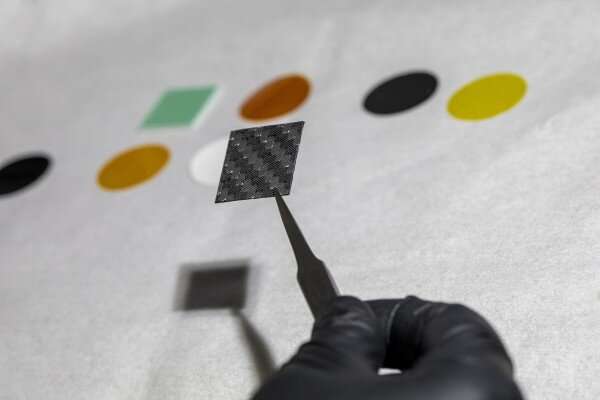
For the next six months, a camera system on the exterior of the International Space Station (ISS) will be snapping photos of more than a dozen different material samples, gathering detailed information that will help researchers determine how—and why—the harsh conditions of space affect these materials. Among the issues to be studied are color changes that may indicate the degradation caused by exposure to the environment in space.
A key goal of the research will be to correlate the color changes that occur under low-Earth orbital (LEO) exposure with variations in the materials' properties—such as structural strength, chemical composition, and electrical conductivity—to determine how these spectral changes might allow scientists and engineers to visually assess deterioration.
We're heading to the moon and maybe Mars. So who owns them?
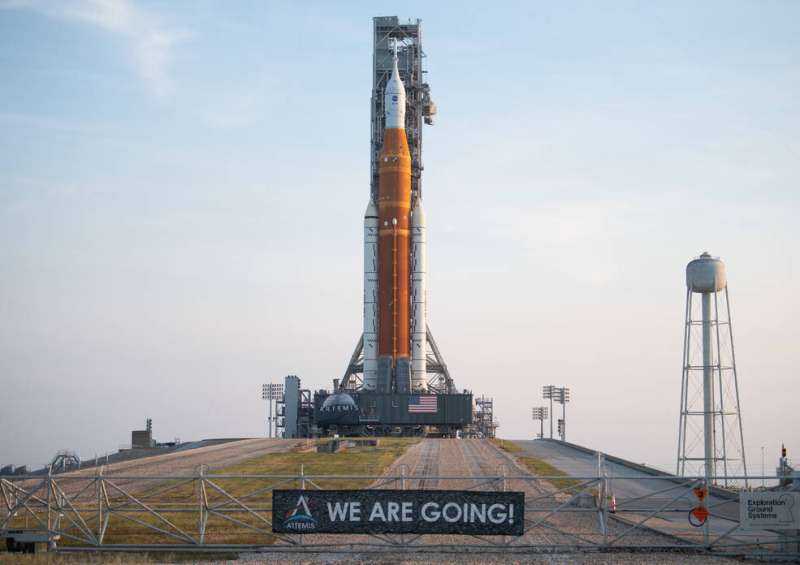
This team of amateurs built a satellite that NASA is taking to space
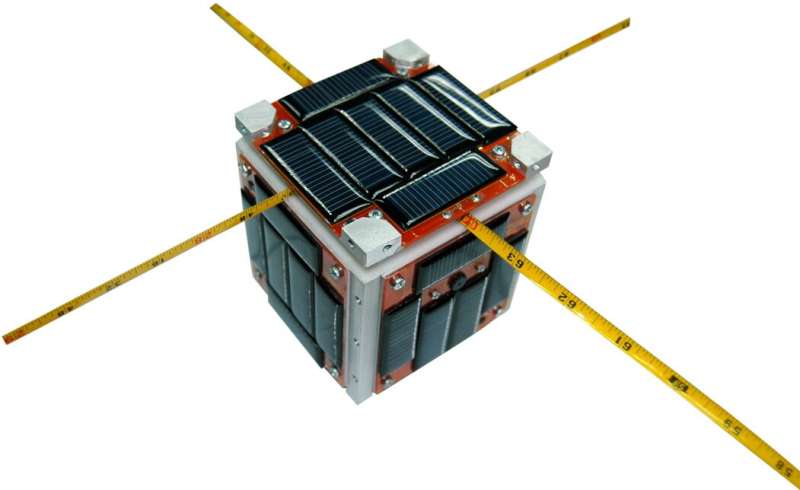
If NASA is to boldly go where no man has gone before, the federal agency might have Tampa to thank for it.
NASA is set to launch the unmanned Artemis 1, the first flight of its larger Artemis program mission to build a moon base and send astronauts to Mars.
Such accomplishments will require affordable and reliable deep space communication. That's where Tampa comes in.
A team of mostly amateurs from around the country—but based out of Tampa—built a CubeSat, which is a miniature, cubed-shaped satellite used in space exploration in recent years.
The size of two loaves of bread side by side, their solar-powered CubeSat will hitch a ride on Artemis 1, get dropped off short of the moon and then propel itself as far as 28 million miles farther. All the while, their CubeSat will transmit information back to Earth.
"It's pretty unbelievable," said Wesley Falor, head of the group known as Team Miles.
First exoplanet image from James Webb Space Telescope revealed
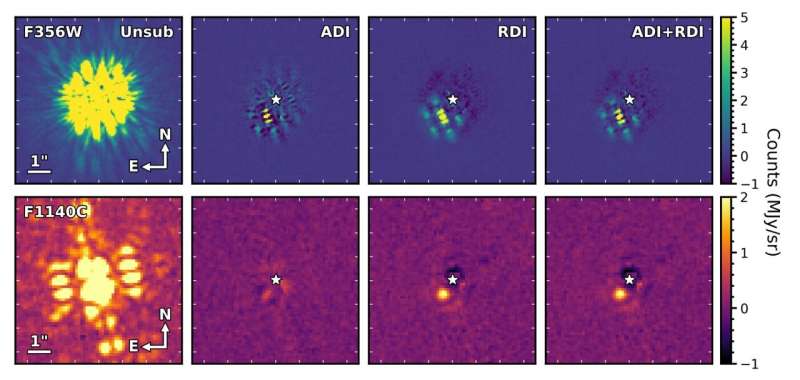
Video: 'Fuel to Mars' study heads to moon
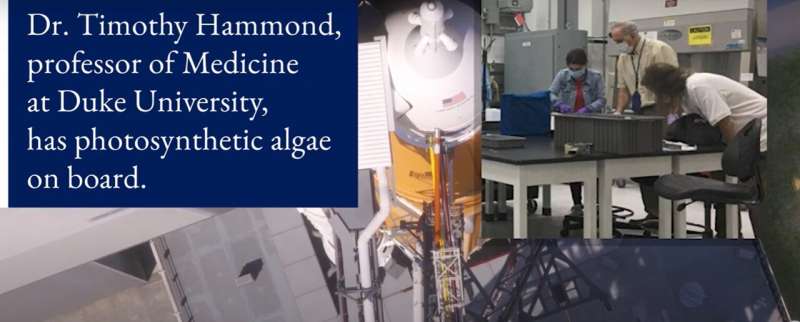
A Duke research study is preparing to blast off to the Moon with NASA on Artemis I.
Dr. Tim Hammond, professor of medicine at Duke, and co-investigator Dr. Holly Birdsall created the "Fuel to Mars" study to identify genes and gene pathways that fuel-producing algae use to survive deep space. A duplicate control experiment is housed at the Durham VA hospital to see how the algae grow without exposure to radiation and microgravity.
Their findings could help pave the way for future human space explorers.
The Artemis I, which has been delayed once already, is scheduled to blast off Saturday.
Explore further
Plant growth in China's space lab in good condition
 The seeds of two plants in China's Wentian lab module have germinated and are now in good condition, according to a briefing on the progress of plant culture experiments in the country's space station on Monday.
Seed samples of the two plants, Arabidopsis and rice, were installed in the life ecology experiment cabinet of the lab module, which went into space in July. The space growth exper
The seeds of two plants in China's Wentian lab module have germinated and are now in good condition, according to a briefing on the progress of plant culture experiments in the country's space station on Monday.
Seed samples of the two plants, Arabidopsis and rice, were installed in the life ecology experiment cabinet of the lab module, which went into space in July. The space growth exper Solar satellite breaks ground with new data
 China's solar observation satellite has achieved major scientific and technological feats during its in-orbit operation, according to the China National Space Administration.
The satellite Xihe, named after the sun goddess in ancient Chinese mythology, has carried out spectral scanning and imaging of the sun's H-Alpha waveband and has recorded the dynamics of the solar activities in the st
China's solar observation satellite has achieved major scientific and technological feats during its in-orbit operation, according to the China National Space Administration.
The satellite Xihe, named after the sun goddess in ancient Chinese mythology, has carried out spectral scanning and imaging of the sun's H-Alpha waveband and has recorded the dynamics of the solar activities in the st 